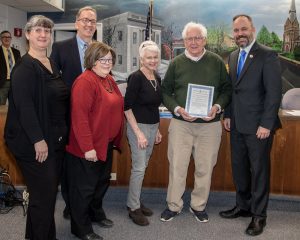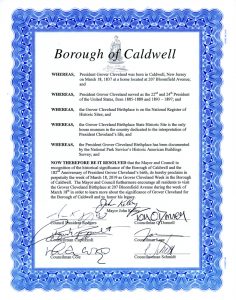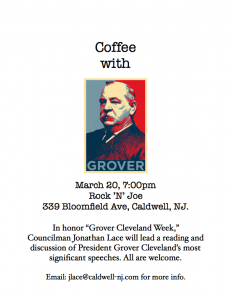

The public is invited in New Jersey, and nationwide, to take part in GROVER CLEVELAND WEEK, a celebration taking place during the week of March 18th, officially proclaimed by the Borough of Caldwell’s Mayor and Council to help mark the 182nd birthday of U.S. President, Stephen Grover Cleveland.
Representatives from Cleveland’s native home-town of Caldwell New Jersey, encourage gestures nationwide that reflect Cleveland’s childhood, as well as his later career. Celebrate with some of Cleveland’s favorite foods and beverages. Or, to honor his terms as President, take time to study our Nation’s founding documents and our notable doctrines.
Here are some suggestions:
1. Honor his mother, Ann Neal Cleveland, by visiting the home where he was born at 207 Bloomfield Avenue, Caldwell, NJ. Cleveland wrote of his mother, “I have always thought her prayers had much to do with my success…” Weather permitting, on Monday, March 18th, we will be open in honor of Cleveland’s birthday from 1-4. Then at 4pm, a short memorial ceremony will take place, with a talk by Louis Picone, a presidential author and scholar and faculty member of William Paterson University. Or visit on another day, since the site is OPEN Wednesday through Sunday year round. Call ahead to confirm accessibility during winter months. 973-226-0001
2. Enjoy some apple-based treats or beverages, and recall local Caldwell hero, Phebe Crane. In 1840, at thirteen years old, she rescued Grover Cleveland from a moving vehicle on Bloomfield Avenue. An ox-drawn wagon heavily loaded with local apples (world-famous for making delicious “Newark Cyder”) nearly ended the future president’s life when he was barely more than a toddler.

3. Read the Constitution, and the Monroe Doctrine. Pocket sized copies of the Constitution will be given to visitors to the Birthplace on March 18th from 1-4 while supplies last. And on March 20th, 7pm, Councilman Jonathan Lace, contact: jlace@caldwell-nj.com , will share round-table style several of President Cleveland’s more famous writings at Rock’n Joe’s in Caldwell. Some of which refer to excerpts from the Constitution. Cleveland vetoed more measures than all the presidents before him combined, multiplied by two, and then some. These numerous vetoes often included detailed explanations of why he was rejecting the proposed legislation, repeatedly citing sections of the Constitution, or explaining that he could find nothing in the Constitution to warrant the bill. He invoked the Monroe Doctrine in foreign relations; during an intensifying border dispute between Venezuela and Great Britain, during the Cuban Insurrection against Spain, and referenced it in his message to Congress in his analysis of the U.S.’s military dealings in Hawaii.
4. Eat corned beef and cabbage! It was one of Cleveland’s favorites. He told the tale of how the scent of corned beef and cabbage from the White House servants’ dinner once caused him to trade his meal cooked by the White House’s French Chef, for a plate of theirs instead. He declared, “And I had the best dinner I had had for months … Boeufe corne’ au cabeau!”
5. Teach a child to help with household chores, a definite part of his and his eight siblings’ upbringing. Family stories mention such things as “Grover” doing laundry with his mother, or rocking his younger siblings to sleep. He recalled, “Often and often as a boy, I was compelled to get out of my warm bed at night to hang up a hat or other garment I had left on the floor.”
6. Drink a pint, and sing! Your local pub would substitute nicely for the German beer gardens and Irish pubs of Buffalo that could attest to the twenty-something to thirty-something future president who enjoyed both beer and singing, and frequently. Karaoke anyone?
7. Get outdoors at Essex County’s Grover Cleveland Park, or drive to a rural trail in the country, and get in nature. Cleveland loved the outdoors. Fishing, hunting, and just walking. He wrote often of how the outdoors was a great benefit to health and well-being.
8. Sing together at home. The Cleveland children sang together every night with their parents.
9. Guide, or substantially help, a family member struggling to save for college. At fifteen years old, Cleveland’s meager earnings as a clerk at a general store helped to fund the college education of his older brothers. As a young adult he supported the education of his younger sisters, and in his old age, that of his nieces. At sixteen, since Cleveland took on being provider to his widowed mother and younger siblings, he never had the time or money to attend college, but he always valued higher education. To his last days, he would speak of how he had wished he could have had the means or time. It is interesting that at about sixteen years old, Cleveland was offered a full scholarship by a neighbor, but the condition that Cleveland must use his education to become a minister, caused him to decline the generous but entangled offer. He had all intentions of becoming a lawyer.
10. Spend time reading or studying a subject you love. Cleveland enjoyed poetry, historical biography and never forgetting his religious upbringing, regularly read the Bible. Cleveland became a lawyer by “reading for the law.” He had the gift of memorization from a very young age. A story in his law firm went that his dear friend and law partner, Oscar Folsom, relied heavily on Cleveland’s ability to recite precedents from memory. At one point, Cleveland retorted, “Go look it up, and then you’ll remember what you learn.” Folsom replied, “I want you to know, that I practice law by ear, not by note!” then turned on his heel and walked away.
11. Attend a live stage play as a family. Especially during his post-presidency years, Cleveland and his family loved the theater, attending Broadway shows regularly. Later, his youngest son would become an actor, and help co-found a summer theater in New Hampshire.
12. Have your life insurance in order as a tribute to Cleveland’s dedication to trustworthy life insurance policies. He labored long hard hours in his late years stabilizing a major company in the life insurance industry at a time when he said, “its policyholders were distressed with fear and gloomy forebodings” from which he eventually corrected the, “breach of trust….pending its reformation.” He continued as a strong advocate of life insurance during his twilight years.
13. And last, but not least: Consider entering politics as a public service. Cleveland felt his time serving in assorted public offices was his personal sacrifice and offering to his community and his country. He encouraged others who had the energy, honesty and intelligence to do the same.
Contact us: 973-226-0001, gcmuseum@gmail.com, presidentcleveland.org, https://www.facebook.com/ClevelandBirthplaceAsso
